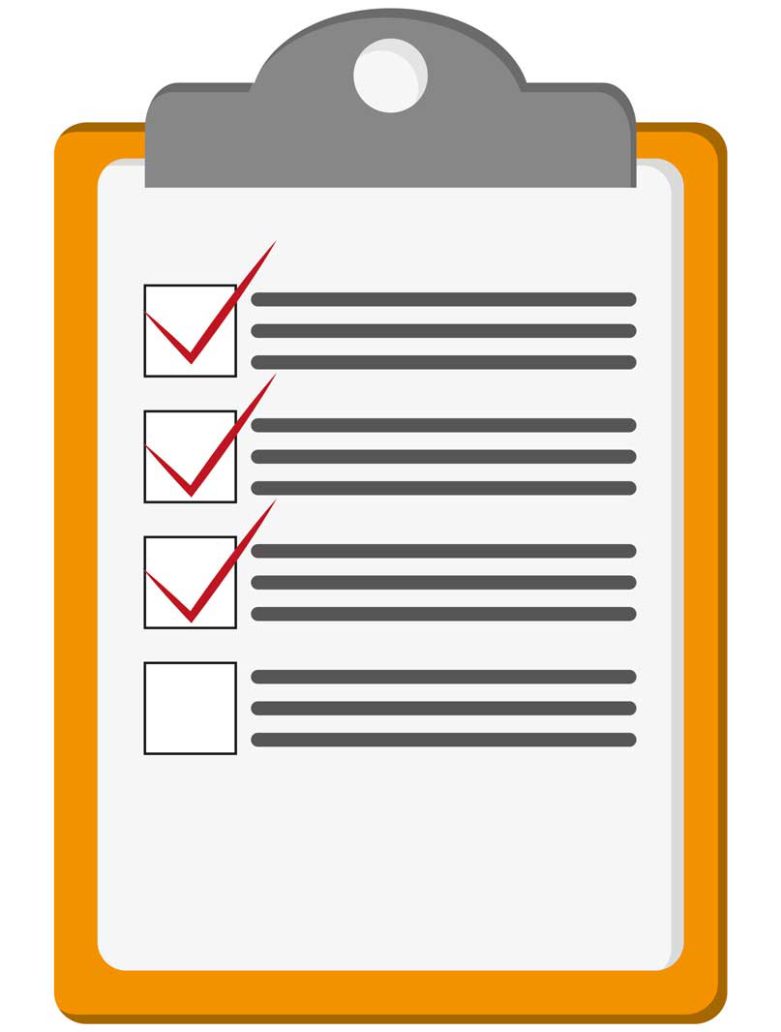During the morning of Christmas Eve, our family of four was in midtown New York City, but not for the Rockefeller Center Christmas tree.
Instead, we were at a law office signing important documents everyone should have (and more paperwork than a typical real estate closing!). Our daughters signed their power of attorney documents, which name who can take over their financial accounts and decisions if they are unable to manage themselves, and health care proxies, which are similar documents for medical decisions.
Scott and I signed power of attorney documents, health care proxies, as well as an updated estate plan, including a newly created revocable living trust. We had created a traditional will over 20 years ago, when our first daughter was born. Having a child is an obvious nudge to do what otherwise might be overlooked or procrastinated on. We wanted to name a guardian and put financial provisions in place in case something happened to us.
At the time, we were in our mid-20’s with few assets and just one kind of asset (paper investments), so a traditional will made sense. When we had our second child, we had one real estate property. However, it wasn’t enough to make major changes at that time — it was just one property, and we were exhausted and overwhelmed juggling now two kids with our two office-bound jobs.
Our approach has since changed, and this post details our months-long journey (and counting) to update how we’re handling our estate plan. We are not attorneys, and nothing in this post should be considered specific legal or financial advice. But once you see all the moving parts, you may decide to get started now, when you can tackle it a little at a time, and not wait till the last minute (or worse, stick your beneficiaries with a lot of confusion and extra work!).
Estate planning is critical, but many people don’t do it
There have been several high profile cases of famous people who have passed away without a will, and the complications it creates for their heirs or families. Prince and Aretha Franklin are prime examples.
But the most obvious lesson of the Prince tragedy remains, and it is utterly prosaic: If you die without a will, you might leave behind confusion. Prince’s assumed massive estate, believed to be worth hundreds of millions, is still unsettled, still not officially valued and still not disbursed to the heirs, his six siblings.
usatoday.com
Even if your estate is more modest than Prince and Aretha Franklin, it can get very complicated for your survivors if you don’t have a proper estate plan. We’ve encountered probate issues in 2 of our own real estate closings.
One real estate purchase had to be abandoned completely because only after we went into contract did we find out that probate was necessary and that it would be a very lengthy process. In the other case, we almost had to back out of purchasing our New York City apartment because we had a deadline to leave our prior rental, and the family of the sellers (who were both elderly and had died) had a hard time tracking down a sibling for a needed signature.
This Gallup poll, completely shortly after Prince’s death, reports that only 44% of adult Americans have a will, and even high earners are not likely to have one, with only 55% that earn higher than $75,000 per year having one.
Life changes prompt a new estate plan, not just an update
For us, a lot had changed in the 20+ years since our initial planning. Three changes in particular prompted us to go for an overhaul of all of our documents:
- Our portfolio is more complicated
- We have moved to Florida
- Our youngest daughter turned 18
Over the last 20 years, we have bought and/or sold 18 properties and are net 11 properties currently. We also run two LLC’s. Finally, our portfolio still has paper investments. We also have assets in two different countries and three different states. It would be a lot for an executor to track down, and the delay would be costly to the rentals and businesses that need ongoing management.
This prompted a redo of our LLC operating agreements to ensure we had a successor manager in place who could take over immediately. We also decided to create a revocable living trust instead of a will. With a trust, we can title most of our assets into the trust and have most everything pass through to the beneficiaries without the time delay and expense of probate proceedings. We do have a pour-over will, which is a short will that covers any items that don’t have title (such as heirlooms), but the bulk of assets will skip probate and pass through the trust.
In addition, we are moving our primary residence to Florida from New York State for 2020 and beyond. Our documents all need to be updated for our new address and any compliance requirements that differ between New York and Florida. Since we would need to make a substantial number of changes anyway, it was a good time to change over from a will to a trust.
Finally, this past year, our youngest turned 18. While she’s still a dependent for tax purposes, she’s an independent adult in the eyes of the law. Health care privacy restrictions under HIPAA (Health Insurance Portability and Accountability Act) prevent medical staff from discussing the health issues of adult children with their parents, even if the children are still dependents (and even if the children are on the parents’ insurance!).
We skirted the issue with our older one and pulled a makeshift health care proxy online. I don’t even know if that was ever valid, and luckily we never needed to find out. However, with two kids now over the age of majority, we really wanted to get the documents done right so that if (Heaven forbid) there was a medical emergency, we would be legally allowed to be involved. Many lawyers draft health care proxies and power of attorney documents when creating an estate plan, so it would easy to bundle all of these tasks at one time.
You will get a lot of different advice – analysis paralysis is real

To review our existing documentation and update or create what we needed now, we ended up going back to the estate planning attorney who created our original wills and to the small business attorney who created my first LLC. I did shop around at first, not so much for pricing (though that varied) but primarily to see if a change in provider made sense given how much our portfolio had changed.
Should we go with a Florida-based attorney? As it turned out, both our estate planning attorney and our small business attorney had ties to Florida, so regional expertise wasn’t a deciding factor.
Should we choose someone who specializes in real estate? Based on real estate blogs that I follow, it seemed that some investors had much more complicated structures than we did – corporations that owned LLCs that owned land trusts. I talked to four other estate planning firms, and each had a different recommendation. Several wanted to overhaul our tax filings, which would mean a change in accounting. Pricing varied from just over $1,000 (if we cobbled something together using Legal Zoom) to over $15,000 with a firm that promised they had practice areas in estate planning, small business and tax.
The attorney research took several weeks and was the longest, most stressful part of the process. No one had the exact same solution. I felt like I needed to be a lawyer myself in order to properly vet the legal recommendations I was getting. Consultation calls would take up to an hour. There were plenty of emails back and forth, and I had to prepare information just so I could ensure they could handle what we needed. Finally, digging for references took considerable time.
In the end, we opted to go back with our original attorneys. Both had been very responsive over the years, so they were front-runners to retain our business anyway. The fact that both are still in business after over 10 years with us (20 years in the case of our estate planning attorney!) was meaningful. I also appreciated the simplicity in their recommendations.
There is much more still to do

Once we picked the attorneys and apprised them of our situation and our goals, it was quick order to get the final documents to sign. The health care proxies and POA’s are all done for the four of us. However, there is much more still to do:
- Retitling of assets
- Finalizing beneficiary and succession forms
- Passing on of key information
- Passing on of digital assets and passwords
We need to sweep our real estate, LLC’s and any non-retirement paper investments into the trust. The convenience of a trust over a will only works if you actually put assets into the trust. So I need to coordinate the retitling of five of our properties. While we have 11 total, we only have to change over five of them.
Three properties are owned by our retirement trust, so we don’t need to do anything there as retirement assets pass to beneficiaries directly and don’t need to be placed into another trust. Two properties are titled to our real estate LLC, and the LLC shares will be transferred to the trust, so that does not require re-titling of the properties themselves. Finally, our property in New York City is a coop, which would be too much of a pain to transfer into the trust (it would require a new Board application and onerous fees), so we’re just skipping that. Yes, it would mean that we would have to pass the coop via a will and probate that will, but since we’re not sure we’re keeping that coop forever, we don’t want to do anything too drastic right now.
We also still need to track down beneficiary forms for all of our assets. What I love about our estate planning attorney is how thorough she is. She is on me to get copies of our beneficiary forms, even though she doesn’t need to do anything with these. She checks to make sure we indeed have informed our banks and brokerage houses about who can access our accounts. I could have been working on this all along while the trust was being created, but I haven’t done anything yet. I know we have signed beneficiary forms in the past with our financial accounts but I don’t have them all in one place, so I am grateful she is on me to track these down.
While our kids know superficially what we have and how our estate plan is structured, that’s not the same as knowing where everything is and what the immediate next steps should be if they needed to take over. To this end, I am compiling an Excel spreadsheet that has all the key information:
- Key contacts, such as our estate planning attorney, small business attorney, and accountant
- Contacts relevant to specific assets – property managers for each of our properties, the real estate agents we worked with, the title companies we used, etc.
- Property addresses and account numbers for tax and insurance
- Account numbers for bank accounts and other paper assets
- Insurance policy information – agent contacts, policy numbers, policy amounts, etc.
- LLC operating agreements
We also have a fireproof box that contains hard copies of important documents, such as the trust document, deeds, mortgage payoff records, etc. Some of the electronic information is redundant with the hard copies, but I suspect that the spreadsheet will be a lot easier to follow and manage so I want to make sure it has everything.
Once I have the spreadsheet filled out and the box filled in, I also want to create a video with verbal instructions and screen shares that show where all the electronic copies are. With platforms like Zoom, it’s very easy to create this type of video. Now I just have to record it!
Passwords and digital assets are still TBD

There is language in our pour-over will that mentions digital assets, but I haven’t even begun to research how easily and comprehensively social media accounts transfer over. Most importantly, we haven’t decided the best way to ensure that our beneficiaries can access whatever they need from our online accounts.
I’m assuming that naming a successor manager to our LLC’s will be enough to enable that person to take over all the relevant accounts. I’m also hoping that filing beneficiary forms with each of our accounts, including our LLC accounts, will ensure that a third party can get access. Once I have everything sorted out with our US accounts, I will also need to double-check Costa Rica!
Estate planning is still a work in progress but I’m glad we got started
We still have some ways to go. I started the key contact spreadsheet in Excel a few years ago when we had amassed multiple properties. I keep adding to the spreadsheet, as well as editing and deleting when things change, like selling our Indianapolis properties or switching property managers. Since our estate is constantly changing (hopefully upward but could also be downward if recession comes!), it makes sense that any master accounting system is going to change as well.
Still, I’m glad we got started since it has taken longer and been much harder and more complex than I expected.
======
Have you completed your estate plan? Any tips to get us to the finish line?


 We are Scott and Caroline, 50-somethings who spent the first 20+ years of our adult lives in New York City, working traditional careers and raising 2 kids. We left full-time work in our mid-40’s for location-independent, part-time consulting projects and real estate investing, in order to create a more flexible and travel-centric lifestyle.
We are Scott and Caroline, 50-somethings who spent the first 20+ years of our adult lives in New York City, working traditional careers and raising 2 kids. We left full-time work in our mid-40’s for location-independent, part-time consulting projects and real estate investing, in order to create a more flexible and travel-centric lifestyle.  Financial independence and early retirement is not something we originally focused on, but over time realized it was possible. Our free report,
Financial independence and early retirement is not something we originally focused on, but over time realized it was possible. Our free report, 








When my parents died I handled most of the executor duties. Their estate wasn’t large but it was over seven figures so it was significant. They had everything in a trust but since they had no real estate it turns out the trust wasn’t necessary and actually complicated things. All their assets were in retirement plans, taxable brokerage accounts and bank accounts. Since all of that can transfer via contingent beneficiary designations there was only a small amount that had to go through an expedited probate process. In our case, my wife and I recently updated our documents, and because our modest house is the only asset that would go through probate we chose to just use contingent beneficiaries instead of a trust as well. But either way works and I can see the benefit of a trust if your estate contains a lot of real estate or if you worry about kids not handling the inheritance well. If not, keeping the trust valid would be a lot of work for not much benefit.
Thanks for sharing your experience. I do think the real estate was what pushed us over the edge into choosing the trust. We anticipate keeping all of our properties long-term.